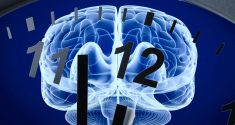Poor sleep quality can have a negative impact on memory. Research has already shown that fluctuations in nightly sleep duration and reduced sleep quality impair older adults’ ability to recall information about past events. It has been known for decades that important things happen during sleep in terms of consolidating memory and strengthening recollections. Current research suggests that certain sleep disorders such as sleep apnea can affect memory function.
Link Between Sleep Apnea, Memory Function and Alzheimer’s Risk
A research team led by the University of California, Irvine, has uncovered the link between the frequency of sleep apnea events during the rapid eye movement phase and the severity of verbal memory impairment in older adults at risk for Alzheimer’s disease. Verbal memory refers to the cognitive ability to retain and recall information in the form of spoken words or written text, and is particularly vulnerable to Alzheimer’s disease.

Most sleep hours do not fall during REM sleep, so the overall average of apnea severity may look much lower than what is typically observed during REM sleep. This means that at-risk individuals may be misdiagnosed and incorrectly treated because current assessment standards are not focused on sleep stage-specific apnea severity.
In addition, the researchers found that a greater proportion of apneic events in women occur during REM sleep than in men, possibly contributing to their higher risk of Alzheimer’s disease. The study involved 81 middle-aged and older adults from the Wisconsin Alzheimer’s Disease Research Center with elevated risk factors, 62 percent of whom were female. Participants underwent polysomnography – a comprehensive test that records brain waves, eye movements, muscle activity, blood oxygen levels, heart rate and breathing during sleep – and a verbal memory assessment.
The results showed that apnea events during the REM phase are a crucial factor contributing to the deterioration of verbal memory, especially in individuals with a genetic predisposition to Alzheimer’s disease and in those with a parental history of the disease. These findings highlight the complex relationship between sleep apnea, memory function and Alzheimer’s risk. According to the researchers, identifying and treating REM-specific events is critical to developing proactive, personalized approaches to assessment and treatment tailored to individual sleep patterns.







